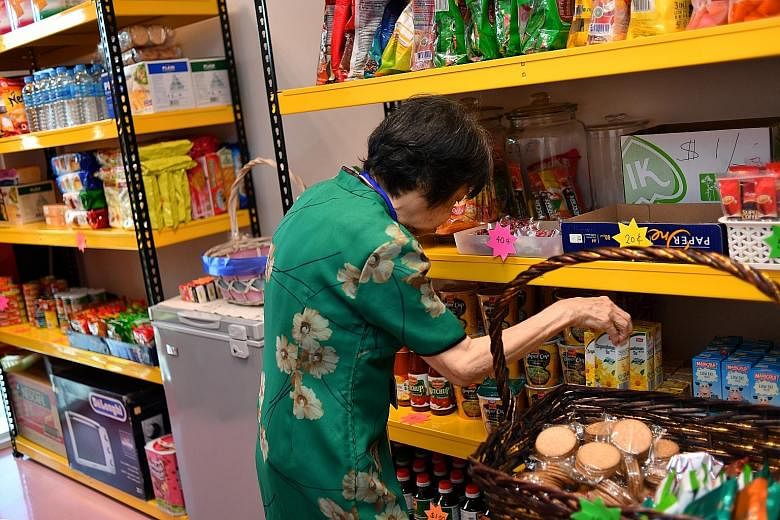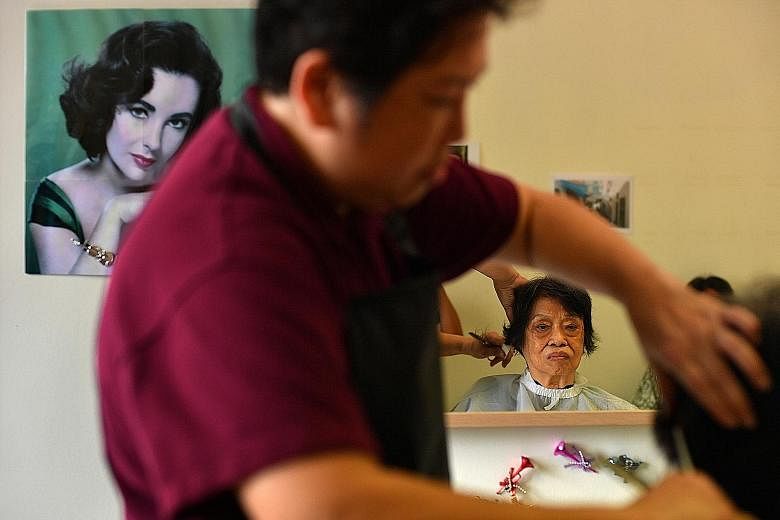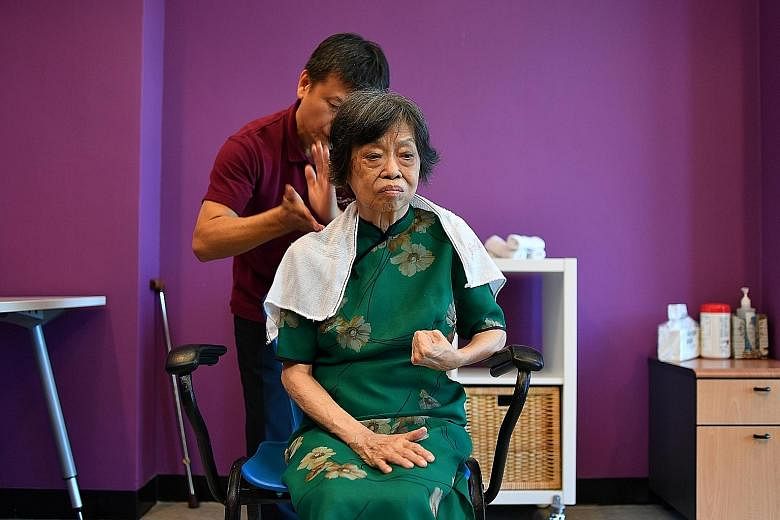With furrowed brows, Madam Jennifer Ng, 78, pedalled hard on the leg-cycle machine in front of her.
Exercising on the machine for 15 minutes earns her just 10 cents, but every cent goes a long way towards letting her do what she wishes to for the week ahead.
Earlier that Monday morning, she had already chalked up another 10 cents by joining in group exercises of stretching and ball throwing. Taking into account that morning's work, Madam Ng quickly calculated the new amount she has in her kitty: $1.90.
"It is not easy to earn money here," muttered Madam Ng under her breath.
Yet Madam Ng has always been more of a spender than saver, and she would spend most of her money that afternoon.
Though she deals with a monetary system every day, Madam Ng actually lives in an institution - Peacehaven nursing home at 9, Upper Changi Road North. She is single and has dementia.
Late last year, the nursing home decided to overhaul the way things were run in the home.
Staff noticed that some residents were passive and lethargic. Often, staff had to chase or nag residents to come out of their rooms to do group exercises or physiotherapy. Things became routine for the residents as they followed a fixed schedule of activities every week.
By then, the management of the home had also made several study trips to Japan and were inspired to adopt some of the ideas they had seen abroad.
So they came up with an incentivising model of care where the 120 nursing home residents and 40 daycare residents there have to "earn" money before they can "spend" it on activities they enjoy.
Madam Ng, for instance, decided to go for a massage after her pedal-cycling session.
As the massage therapist - a staff member who was formerly a professional masseur - kneaded Madam Ng's shoulders, she closed her eyes and relaxed. The massage session cost her 20 cents, but she felt it was well worth the money.
No actual currency is exchanged as staff manning the activity rooms deduct the money owed by using an iPad to scan their resident card, which acts like a credit card. Money is credited in the same way after exercises are done.
After the 20-minute session, Madam Ng told her senior care associate that she wanted to go to the minimart next door.
Once inside, her shopping was swift and efficient. She zoomed in to take a cup of instant noodles (60 cents), a packet of Hacks sweets (40 cents) and two packs of biscuits (20 cents).
The former English teacher explained: "I always go for instant noodles because I don't have much appetite for rice. The sweets, I have them after taking medicine that is bitter."
The minimart is well stocked with items and brands that the seniors are familiar with - Khong Guan biscuits, Da Hua soy sauce - and they are priced roughly at the same price point as supermarkets outside.
Said Mr Ng June Ren, a senior occupational therapist who started the Life We Know programme in the nursing home: "After people are admitted into an institution, they lose their usual way of living.
"When they lose their autonomy, they can become disinterested in beneficial activities and their health and social life deteriorate."
He added: "That is why we want to replicate what is available outside - whether massage or minimart - so that they can continue to enjoy these normal activities which they were once familiar with, but within a nursing home."
True enough, the "hair salon" that Madam Ng chose to go to looked like it came from the pages of a 1980s magazine. Posters of the perfectly coiffed hair of actresses Marilyn Monroe and Elizabeth Taylor hung on the walls, next to huge mirrors.
Within those few hours, the balance of her "bank" account had dwindled to 30 cents.
"Why can't we also earn money from hydrotherapy or badminton?" she complained to Mr Ng, eager to find new streams of revenue.
Mr Ng told her he would consider it. "This is the kind of proactiveness and engagement that we are looking for. Residents no longer need to be chased from their rooms to do the group exercise, now they just all turn up at 8.30am sharp," said Mr Ng.
He explained that giving them choices and a sense of control in how much they exercise and spend their money empowers them with a sense of purpose.
Mr Teo Wu Lam, 61, for instance, used to prefer to stick to his routine of eating, sleeping, reading newspapers and watching television in the 11 years that he has been with the nursing home. However, he has been diligently doing his exercises every day now because he enjoys going for a massage every Friday and playing bingo every Wednesday.
Besides doing the exercises, residents can earn money if they help the staff with daily chores.
Mr Ng said the home will soon allow residents to use their internal currency to order hawker food from outside once a month.
Orders will be taken for say, Boon Tong Kee chicken rice, two weeks in advance to give residents a chance to save up. Staff then go out to buy the food.
"Life is now more exciting. You feel like you have achieved something when you earn the money but of course, I have to think hard about what I want to prioritise to buy," said Madam Ng.
"If not, you need a godfather," she added, glancing sideways and smiling cheekily at Mr Ng, who sometimes gives her free treats.




